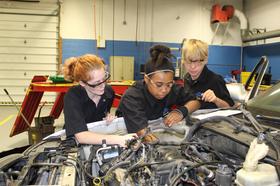Despite the economic slowdown that has hit the country, and especially areas of the Midwest, there are jobs available for those with experience in the manufacturing industry. The secret to gainful employment may be as easy as honing your skills at a local community college with up-to-date programs in green manufacturing.
One of the brightest spots in the industry currently appears to be in composite technology, the manufacturing of composite materials for a variety of uses. Community colleges across the country are heeding the call for composite technicians by offering specialized programs to prepare students for entry into the industry.
What is a Composite Technician?
According to the website for the Miller Business Resource Center at Salt Lake Community College, a composite technician fabricates "lightweight, structurally strong parts and assembly for a variety of job applications."
Some of the industries using composite technicians today include aerospace, wind turbines, automobiles, and marine vessels. In addition to manufacturing, composite technicians may also work in quality control and testing, as well as research and development.
To work in the area of composite technology, many employers want applicants to have a minimum of an associate's degree in Materials Science. However, there are employers working directly with community colleges to create a training program specific to their industry that may be completed in just a few weeks' time. These programs may offer the opportunity to go to work with the employer directly after completion of the program, making
























































